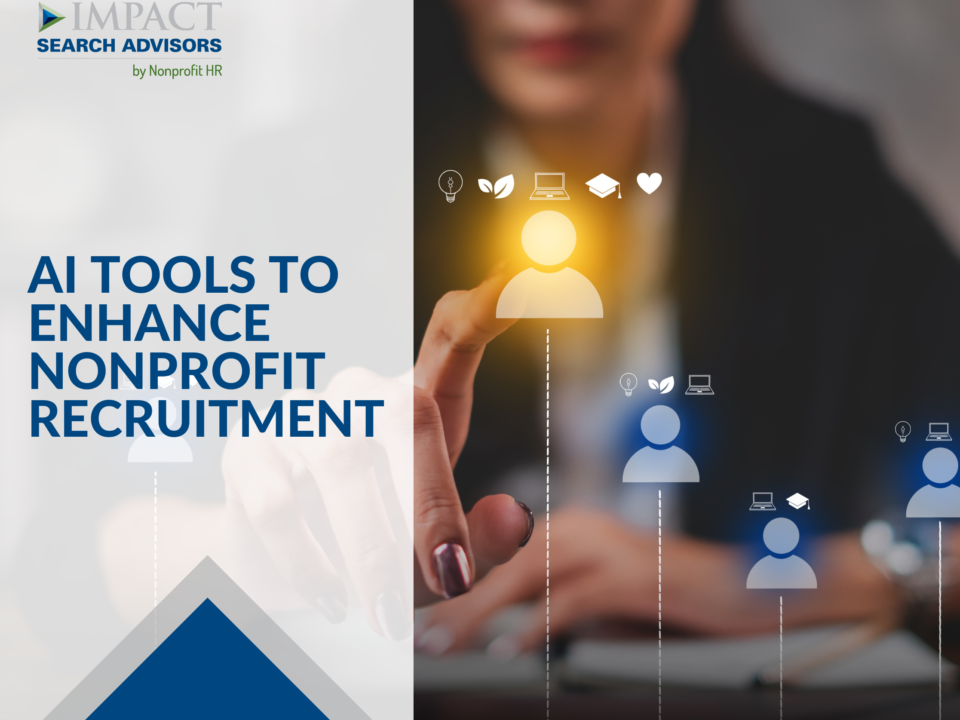
THE SURPRISING WAY MOST NONPROFIT EXECUTIVE SEARCHES GO WRONG
December 3, 2020
7 STAY INTERVIEW QUESTIONS TO ASK C-SUITE EXECUTIVES
December 4, 2020SHOULD YOU RUN YOUR NONPROFIT EXECUTIVE SEARCH INTERNALLY?
An organization is only as effective as its leadership. Here at Nonprofit HR, we partner with nonprofits to find passionate people who will further their organization’s missions. Executive search is a big part of what we do, and we feel strongly that most nonprofits could benefit greatly from building a strong relationship with an executive search that understands their needs and challenges. But we’ll also be the first to acknowledge that there are times when it makes sense for a nonprofit to conduct an executive search internally.
How do you know whether your nonprofit should work with a search firm or independently? It all comes down to these five factors:
- Do you have the time and energy to commit to the process?
- Is the current executive leaving after a relatively short period of leadership? Is the organization in good health?
- Do you have a clear sense of strategic priorities for your new executive hire?
- Do you have a solid understanding of all steps in the process? Is there an individual available (on staff or on the Board of Directors) who has the time needed to effectively manage the process?
- Are you working with a tight budget?
If you answered YES to all of the above questions, it may make sense to conduct the search internally. If you answered NO to some or all of the above (which, in our experience, is far more common), our firm can provide valuable sector-specific guidance and strategic counsel, helping your organization find the right leader for the role and make a seamless transition into your organization. Choosing the right executive will impact your organization for years to come. Choosing the wrong executive can do the same. It’s time to get serious about making smart leadership hiring decisions, whether you’ll handle your next executive search internally or with the support of a search firm.
So let’s dive into each of the factors outlined above. Through this post, you’ll gain a better understanding of what an internal committee needs in order to conduct a successful search and what a search firm can provide when you don’t have the necessary resources or expertise in-house.
1. Do you have the time and energy to commit to the process?
It’s vital to the success of the search to appoint a lead person or search chair to own the process. In many instances, the senior management team or board of directors will put together an executive search committee to manage this important task. Committee members volunteer their time often in addition to their already full plates. In order to make solid decisions, this team needs to have adequate time and energy to put toward the search. It is critically important for the team to be thorough, strategic and invested in each step of the process—a process that can take anywhere from three months to a full year to complete.
If this type of commitment is just not possible given the leadership team or board’s other responsibilities, working with a search firm can be a great option. With Nonprofit HR, you’ll also benefit from our extensive expertise and valuable perspective on the nuances of nonprofit executive searches built through our 20 years in this space.
2. Is the current executive leaving after a relatively short period of leadership? Is the organization in good health?
“When” and “why” are significant factors in how an organization finds a new executive: How long has the current executive been in the position? For what reason is he or she leaving? If the current leader has been at the organization for an extended period of time—10 or 20 years—it is often time to consider a new strategic direction. It’s also a good time to assess the health of the organization as a whole. Sustainability is a key part of selecting new leadership. Is the current executive leaving the organization in a position of strength or weakness? The search committee or board must be engaged in having strategic conversations and decisions about the health and wellness of the organization prior to launching a search for a new leader.
Oftentimes, nonprofit leadership benefits significantly from a search firm’s objective perspective. When an executive has been in place for decades, it’s a great opportunity to look at the larger strategic picture and re-examine what is needed in a future leader. An experienced search firm can play a valuable role in helping leadership think through its current and future needs.
3. Do you have a good sense of strategic priorities?
Bringing on a new executive involves more than finding one person for a specific role. Because of the influence of this person’s leadership, executive transition is also a crucial time to consider the organization’s overall strategic direction. What are the top three or four strategic priorities that the leader will need to focus on? What resources will that person need to bring to the table? How will internal and external stakeholders be impacted?
According to a recent survey conducted by the Stanford Graduate School of Business, 27% of nonprofit directors do not believe that their fellow board members have a strong understanding of the mission and strategy of their organization. If the internal committee is unsure of or ill-equipped for strategic planning, a search firm can facilitate the necessary discussions and offer incredible perspective prior to a search being launched. An experienced search partner will also ask the tough questions that need to be answered before bringing on a new leader.
4. Do you have a firm understanding of all steps of the process?
Not all nonprofit leaders have experience conducting an executive search. It’s a significant undertaking and involves many steps, decisions and inputs. The critical steps go beyond just recruiting candidates, interviewing them and presenting them to the larger leadership team. Consulting key stakeholders, understanding current and emerging business needs, organizational culture and external factors are all key to managing a successful search. Who will provide strategic direction? Who will conduct interviews? Facilitate communication with candidates and external stakeholders? Present to management and staff?
Engaging a search firm ensures that all necessary steps are taken—from pre-search conversations with stakeholders to post-search support and everything in between—in a thorough and efficient manner. Acting as a guide and leader, a search partner will ensure the process stays on track and nothing is overlooked. A search partner also helps to ensure that your organization’s brand is effectively maintained throughout the search process. Failing to manage candidate communications and communications with key stakeholders is a surefire way to negatively impact an organization’s reputation with its board, staff and community members served.
5. Are you working with a tight budget?
The reality is that some organizations don’t have the financial resources needed to retain a search firm. Making the decision to invest in and retain professional search support must be weighed against an organization’s priorities and cash position.
That said, it’s important to keep in mind the true cost of a bad hire, a cost that is easier to avoid with a seasoned search firm at your side. For nonprofits that afford the cost of retaining a search firm, they will very likely see a significant return on their investment.
If your organization is looking to bring on a new executive, I encourage you to think about whether you have the resources to fully commit to running a search internally and effectively. Engaging a search firm provides immense benefits from a time, energy, expertise and perspective. The outcome of a successful search? Putting the best possible leader in place, allowing an organization to move in the right strategic direction and fulfill its mission.
Interested in exploring a partnership with us for your nonprofit’s next executive search? Learn more about our approach and contact us.




